Restore clear vision in 24-48 hours. and eliminates your dependence on glasses or contact lenses with LASIK, PRK or ICL lenses carried out by a refractive surgery specialist with 4,000+ interventions.
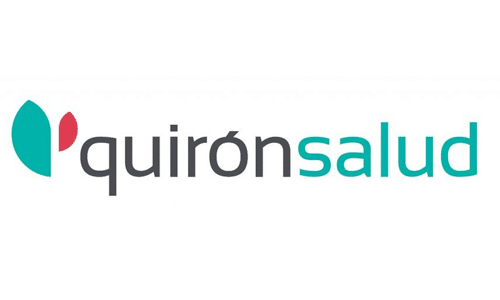
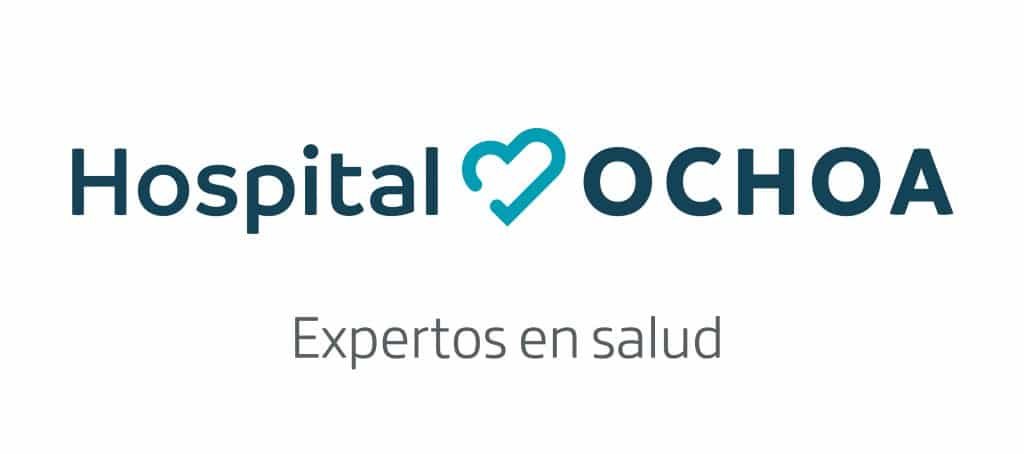

Answer these short questions and we will send you a personalised assessment.
Your vision without glasses may be closer than you think.
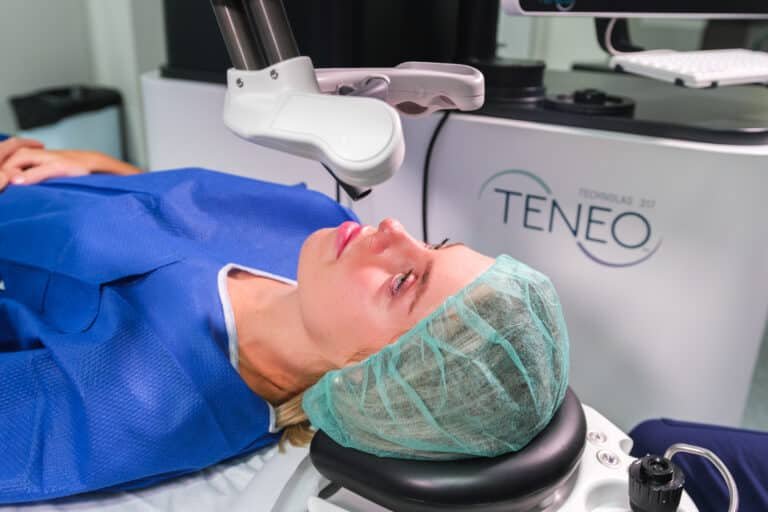
Refractive surgery corrects visual defects such as myopia, farsightedness, astigmatism y presbyopiaeliminating the need for glasses or contact lenses.
This view operation is performed with femtosecond laser and excimer laser for corneal remodelling (LASIK/PRK) or by phakic intraocular lenses (ICL) when the cornea is not an ideal candidate.
It is a procedure fast, personalised and painlesswith same day discharge and visual recovery generally in 24-48 halways with postoperative controls.
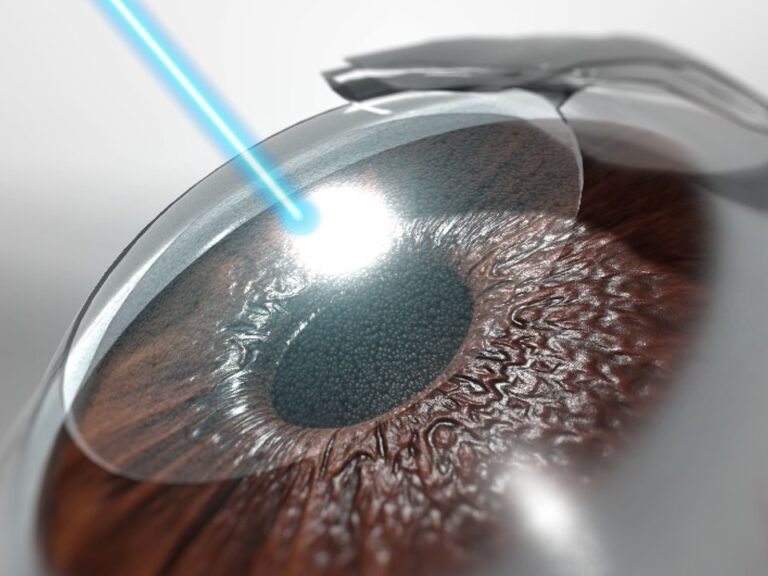
Femto-LASIK (100% laser, no scalpel): more technical popular, fast recovery, painless. In our clinic it is performed exclusively with femtosecond laser, without manual blades, guaranteeing the best results. maximum safety and precision.
PRKSafe alternative for thin corneas or high impact activities (athletes). Slower recovery but similar results to LASIK.
SMILEminimally invasive technique, without corneal flap, ideal for high myopia.
Laser surgery for presbyopiaMyopia/astigmatism correction: we combine myopia/astigmatism correction with specific techniques for eyestrain in patients over 40 years of age.
Intraocular lenses:
Phakic lenses (ICL): for very high prescriptions or corneas not suitable for laser.
Premium multifocal lenses (Lens Upgrade): to correct distance and near vision in a single procedure.
No sedation or admission.
With real-time eye-tracking.
Depending on technique: Femto-LASIK, PRK or ICL
With eye drops (antibiotic, anti-inflammatory, tears).
The cost depends on the technique and whether to intervene one or both eyes. All options include: preoperative study, surgery, revisions y postoperative care.
Financing: Interest-free instalments y fast-track approval. Ask for a transparent quotation after your study.



In our clinic in Marbella we have state-of-the-art equipment to guarantee optimal results for each patient.

Dr. Nowrouzi offers customised 100 % treatments not only to correct refractive defects, but also to treat each patient's unique genetic optical imperfections.
Thanks to the Wavefront Optimized technologyIn this way, it is possible to correct higher-order ocular aberrations that other lasers do not treat, achieving a superior visual quality.
This allows many of our patients to regain a sharper vision y functional than with glasses or contact lensesfrequently reaching visual acuities above 100 %, up to 150 % (20/12) in each eye.
With this, you not only get to see well, but also to see better.
With more than 15 years of experience y more than 4,000 successful interventionsDr. Ali Nowrouzi, ophthalmologist in Marbellais a reference in refractive surgery on the Costa del Sol.
Registered doctor in Spain and Germany
Expert in excimer and femtosecond laser surgery
International training in the United States.
Certified by the American Board of the American College of Surgeons (FACS)
Certified as one of the 50 world's leading specialists in refractive and cataract surgery by the European Board of Ophthalmology (FEBO-CR), and among the most prestigious in the Top 100 International Surgeons by the International Board of the College of Refractive Surgeons (WCRS).
📄 Member number: 291110233
Ophthalmology clinic in the centre of Marbella: Av. Severo Ochoa, 19, 29603 Marbella, Málaga
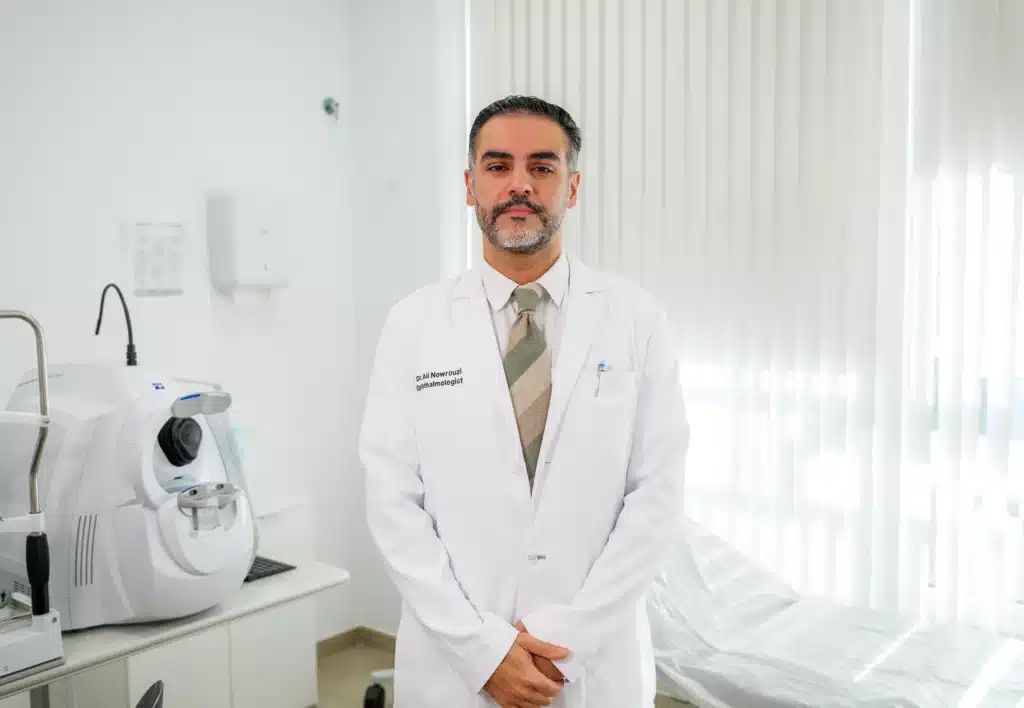
Publicado enTrustindex verifica que la fuente original de la reseña sea Google. Very grateful to have met Dr Ali, can’t imagine if I didn’t meet him, I could still be just like anyone that was frustrated everyday with blurred visions, due to age or natural reasons, and have to continuously switching reading-glasses/trifocal/contact lenses…reluctantly. Dr Ali is kind, talented and always seeking for advance technique, I earn trust & confidence in him after a few consultations and made the life-changing decisions for my eyes. Now seeing a whole new world with my new eyes. Very thankful indeed. The only regret is I should have met him earlier and I could enjoy this earlier.Publicado enTrustindex verifica que la fuente original de la reseña sea Google. Método muy rápido y eficaz, hay un gran equipo detrás de todo y se nota. Muy recomendable.Publicado enTrustindex verifica que la fuente original de la reseña sea Google. Mi experiencia con el Dr. Ali Nowrouzi y su equipo en la clínica Quirón Marbella ha sido excelente. Desde la primera consulta, recibí una atención profesional y personalizada, con explicaciones claras y detalladas sobre el procedimiento. La cirugía refractiva fue rápida y precisa, y el proceso de recuperación ha sido muy satisfactorio. Ahora disfruto de una visión clara sin necesidad de gafas, lo que ha mejorado enormemente mi calidad de vida. Recomiendo sin duda al Dr. Nowrouzi y su equipo en la clínica Quirón Marbella a cualquier persona que esté considerando esta intervención. Su profesionalismo y dedicación hacen que el proceso sea seguro y confiable.Publicado enTrustindex verifica que la fuente original de la reseña sea Google. El Dr. Ali Nowrouzi es un profesional excepcional. Me trató recientemente y he tenido una experiencia excelente. Enhorabuena por su gran labor. Le voy a estar eternamente agradecida.Publicado enTrustindex verifica que la fuente original de la reseña sea Google. Dr Nowrouzi has been extremely professional, tactful and gentle all the way- before and after the delicate surgery my dad underwent. Everything went according to plan with no stress and an endless patience! My father highly recommends!Publicado enTrustindex verifica que la fuente original de la reseña sea Google. Me operé con él en julio de 2024 y mi experiencia ha sido magnífica. Es un gran profesional y de lo único que me arrepiento es de no haberlo hecho antes!Publicado enTrustindex verifica que la fuente original de la reseña sea Google. I am beyond grateful to Dr. Ali for the exceptional care and expertise during my recent eye surgery. From the first consultation to the post-operative care, everything was handled with the utmost professionalism and compassion. Dr. [Name] took the time to explain every step of the process, which made me feel confident and at ease. He takes the time to explain everything clearly to his patients and is extremely sympathetic and kind, making the whole experience much more comfortable.Publicado enTrustindex verifica que la fuente original de la reseña sea Google. I am very satisfied, more than expected. Both with the whole and especially with Ali Nowrouzi, both with the treatment and the friendly attitude. He discovered that in addition to cataracts, I have a degenerative disease, Fuchs dystrophy, which I did not know. Both eyes were quickly operated on and I see much better than I have for a long time, I can even read again! Also, I feel secure in the knowledge that there is treatment in the future as the disease progresses.Publicado enTrustindex verifica que la fuente original de la reseña sea Google. Me ha ido increíble hacia 40 años que no veía tan bien.muchisimas graciasVerificado por: TrustindexLa insignia verificada de Trustindex es el símbolo universal de confianza. Solo las mejores empresas pueden obtener la insignia verificada si tienen una puntuación de revisión superior a 4.5, basada en las reseñas de clientes de los últimos 12 meses. Leer más
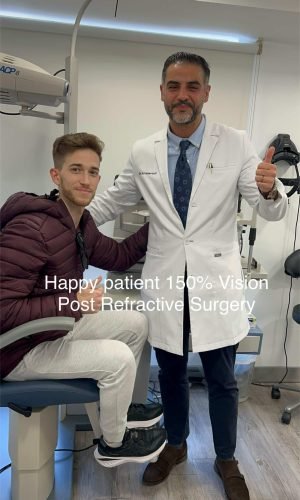
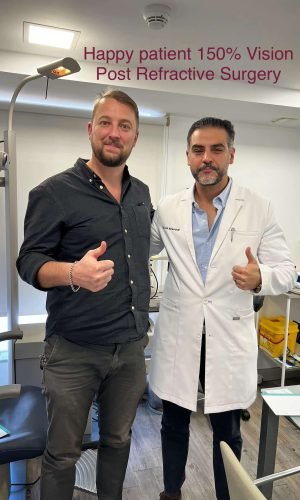
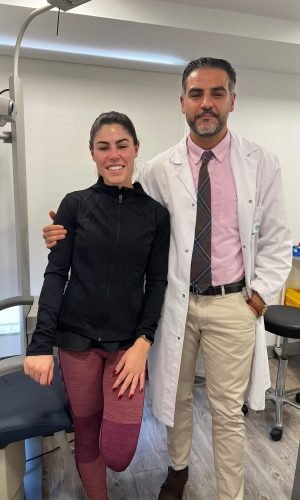
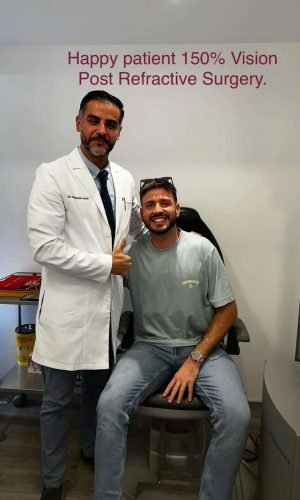
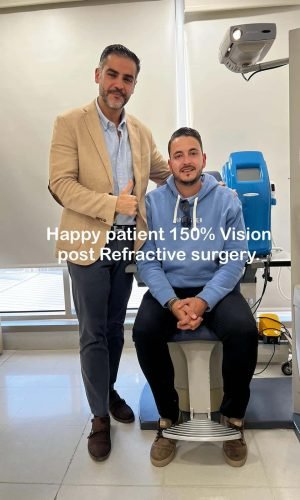
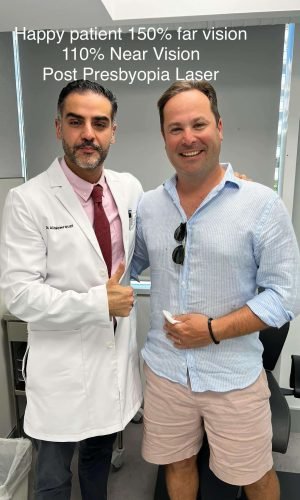
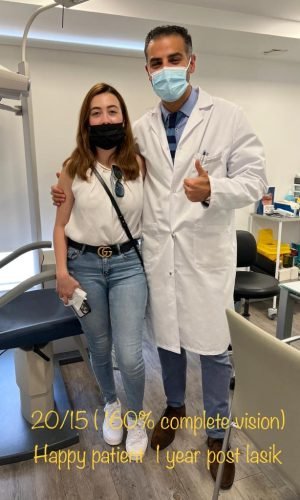
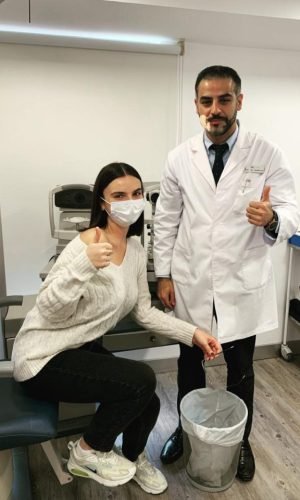
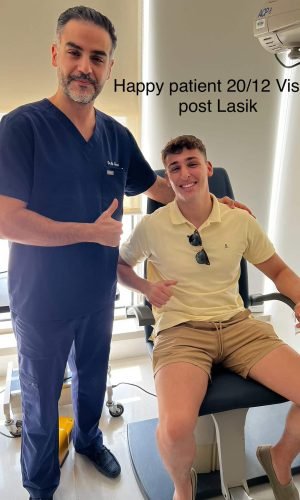
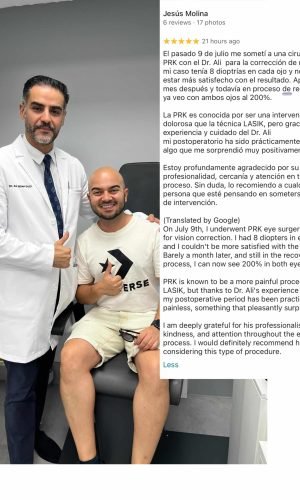
We are located in the centre of Marbella, with easy access from all over the Costa del Sol: Málaga, Fuengirola, Estepona, Benalmádena, etc.
Yes, we work with Adeslas, Sanitas, AXA Salud, AXA Agrupación, Cigna, Mapfre, Aegon, DKV, HNA, Nueva Mutua Sanitaria, ACUNSA, Allianz, Caser, European Commission, Línea Directa, Helvetia, Divina Seguros, Eurocenter, Cigna Internacional, Eurocross, Europ Assistance, FIATC, Generali, GES Seguros, La Unión Madrileña, Mondial Assistance, Occident, SOS Internacional, Alan.
Low-intensity sporting activities can be resumed at approximately one week after the operationprovided that they do not involve a risk of direct impact on the eyes or exposure to dust or water (such as football, swimming or paddle tennis). In any case, prior consultation with an ophthalmologist is recommended.
All surgery carries certain risks, but the most common risk is that the refractive surgery is a safe and widely scientifically validated procedure.. Recent studies indicate that it presents an even lower risk than prolonged contact lens wear under sub-optimal hygiene conditions.
Are both eyes operated on at the same time?
Yes, unless there is a specific medical contraindication, both eyes are operated on during the same surgical session, which allows for a simultaneous and more comfortable visual recovery for the patient.
The surgery is short and efficient. The time in the operating theatre is usually no more than 15 minutes in totalThe laser application takes only a few seconds per eye. The rest of the time is spent on preparation and precise positioning of the patient.
If you have over 18 years olda stable graduation and a healthy eye conditionyou will probably be eligible.
No. All refractive surgeries are performed under drop anaesthesia, with no pain during the procedure. The patient may experience mild discomfort or a gritty sensation during the first few hours after the procedure, especially in PRK.
The risks are very low when the surgery is performed by qualified specialists using state-of-the-art technology, as in the case of Dr. Nowrouzi. Some possible complications include temporary dry eye, night halos or the need for retouching in very high prescriptions, but these are rare and treatable.
There is no risk. An eye separator (blepharostat) is used to hold the eye open safely throughout the procedure, preventing unintentional blinking.
No. The surgery is minimally invasive. In techniques such as LASIK, the thin corneal layer that is lifted is carefully repositioned at the end and adheres on its own thanks to the natural properties of the corneal tissue, without the need for sutures.
In most cases, the patient can rest at home for the first 24 hours. Depending on the technique used and the dioptres corrected, visual recovery may vary, but most patients resume normal activity within 24 hours. 48 and 72 hours later.
The following are prescribed antibiotic and anti-inflammatory eye dropsThe patient should also use artificial tears, which should be applied during the first few days to promote healing and prevent infection. It is important to follow the specialist's instructions to the letter.